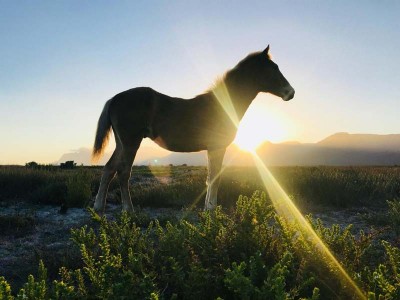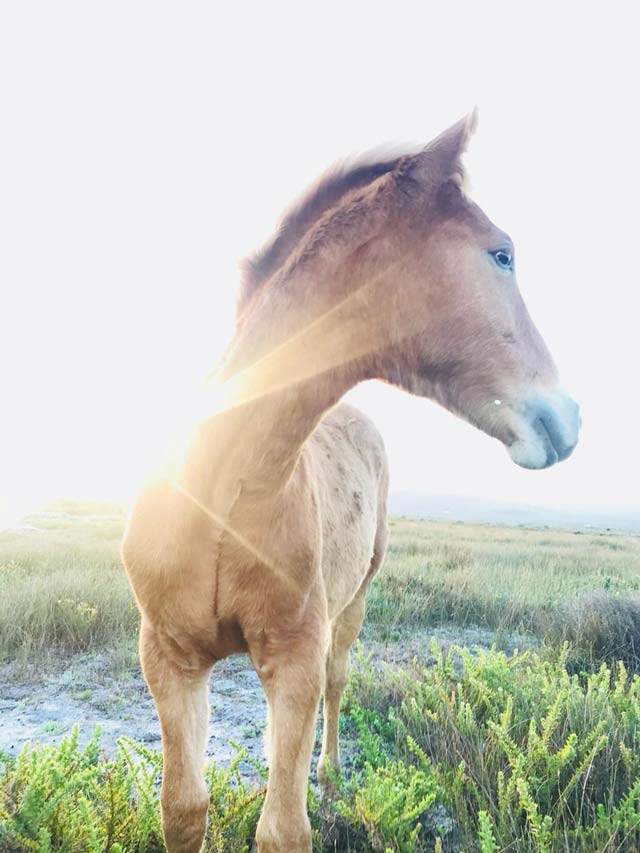Latest news about the Wild Horses at Rooisand Nature Reserve, near Kleinmond
Two groups of horses walked off Lamloch today. 16 horses walked off towards Kleinmond out one of the western gates. 10 horses left hesitantly on the eastern side towards the bird hide.
All horses have been gently encouraged off and are now to be found either in the Rooisand or Kleinmond Vlei areas. From the owner of Lamloch - Craig Saunders on 14 November 2018
The well-known wild horses of Kleinmond [and or]Rooisand Feral Horses] have roamed the Lamloch swamps for many decades. They are heritage horses which belong to no one and yet belong to everyone.
From The Hermanus Times Newspaper - 15 November 2018
Feral horses to be returned to Rooisand
The feral horses of Rooisand will be moved from a fenced-in private property to the adjacent Rooisand Nature Reserve.
Craig Saunders, owner of the Lamloch land in Kleinmond, indicated to Hermanus Times that he will assist in moving feral horses, referred to as the Rooisand group, to Cape Nature’s grounds. A petition by the Rooisand Horse Watch to “free the horses” circulated on social media earlier this week, as several horses were on the Lamloch side of the fence when the gate was closed.
Saunders explained to Hermanus Times that his property consists of 450 ha and that the fencing was put up around his property to ensure the safety of the wildlife on his land which includes kudu, springbok and many other species of game. “The six gates around the fencing can’t stay open at all times, it can result in the game running off,” Saunders explained.
According to Saunders there are currently 21 horses on Lamloch land and seven horses on the other side of the fencing, which belongs to Cape Nature.
On Tuesday 13 November a meeting between Saunders, the Rooisand Horse Watch and Cape Nature took place. The meeting discussed how the horses can be moved to Rooisand. According to Ward Councillor Grant Cohen who chaired the meeting, a committee has been set up to manage the horses and their movement between the two properties.
Saunders says he invested a lot of money into clearing his property of alien vegetation, “therefore the horses prefer to graze on Lamloch land.” He says it was never his intention to keep the horses on his property, adding that he believes the horses add value to the area and are free to move in and out of his property as they wish.
A representative of Rooisand Horse Watch said they are very happy with the outcome of various discussions about the fate of the horses.
“We and the Overstrand community are looking forward to seeing the horses back at Rooisand, free and unimpeded.
We are very grateful for the public’s passionate support for the horses, and the decision of the landowner. The new management committee is a win for the horses and their future welfare. We look forward to participating with all the stakeholders,” said the representative.
Cape Nature spokesperson Loren Pavitt says Cape Nature approved a management plan for the introduction of certain wild animal species to Lamloch Estate. These include species like bontebok, plains zebra, eland, and others. An application for keeping elephants is still under consideration.
Saunders is the owner of three tourism establishments situated in Hartbeespoortdam, Hazyview and Plettenberg Bay respectively and known by the brand Elephant Sanctuary, which offer elephant interactions.
He says that future plans for Lamloch land are still in the pipeline, but he would like to consider tourism opportunities for the property.
by Noluvu Ludidi

-
A bit about the amazing horses
from Getaway Magazine
Professor Frans van der Merwe, who has studied the approximately two dozen horses for the past four decades, describes the Kleinmond herd as feral as opposed to wild. In other words, they are owned by no one and no one takes care of them. These are not like feral horses such as the Mustangs in the United States or the Brumbies in Australia, which are often seen as a nuisance. According to the professor, the horses roam the area from Rooisand to Kleinmond, seldom venturing out of the vlei. They have a happy existence and have no negative impact on the environment.
‘They may, in fact, assist in keeping paths open through dense vegetation, especially through reed beds, which is beneficial to other wildlife,’ he says. ‘One may argue that the horses now fulfill the beneficial role that large wild herbivores once played in this habitat before being exterminated by early colonists and hunters.’ Mostly they die of old age.
Currently, the horses are legally classified as ‘unprotected free-ranging game’. Their future depends on numerous factors, such as available space and food resources, as well as policy decisions by Rooisand Nature Reserve and private land-owners in the area. At present, they enjoy the goodwill of all involved. Let’s hope that continues. - Getaway
Source
Text:
- Hermanus Times - Media24
- Getaway Online Magazine - The wondrous horses of the Bot Rivier wetlands
- Chris Saunders - Owner of the Lamloch land in Kleinmond
- Rooisand Horse Watch
Photos:
- Chris Saunders - Owner of the Lamloch land in Kleinmond
- Martin Etsebeth 2014
Call us and schedule your listing today! Contact Us
Copyright © 2025 Hermanus Online Magazine. Web Development by Jaydee media.









